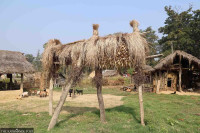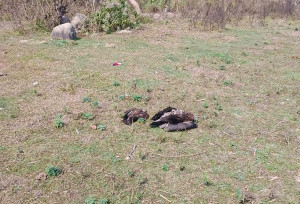A group of local unit chiefs in Palpa have demanded authorities to conduct Covid-19 tests of all individuals who are currently quarantined in various facilities across the district.
The district has quarantined individuals who recently returned from India and other countries.
On Monday, the group of local unit chiefs, including Rambahadur Karki of Rainadevi Chhahara, Narayan Bahadur GC of Ribdikot, Santoshkumar Thapa of Mathhagadhi, and Krishnaprasad Bashyal of Baganaskali rural municipalities, among others, visited Chief District Officer Yadav Subedi and demanded speedy testing of all the quarantined individuals.
“Only once the quarantined individuals are tested can we know whether the district has any Covid-19 cases or not,” Rampur Mayor Raman Bahadur Thapa said.
According to Thapa, over 1,000 individuals who recently returned from abroad are currently quarantined in the district; thirty four of them are found to have returned from Indian states that have reported Covid-19 cases.
Chief of Ribdikot Rural Municipality Narayan Bahadur GC said that the team has also asked Subedi to manage testing kits for the local units.
“Many people in the district are fearful since people returning from abroad are yet to be tested,” he said. “Only after we test them would the locals be assured.”
Even though the district administration has started sending samples of throat swabs to the Capital for testing, health professionals say there is a shortage of protective gears and masks even to collect the swabs.
“While pressure is mounting from all quarters to test the quarantined individuals, we don’t have enough kits for the purpose,” Bishwanath Neupane, acting chief of the District Health Office, said.
Subedi said that the administration has decided to ask the provincial government to provide security kits, masks and other equipment to the district.
“The health condition of all quarantined individuals is normal,” Subedi said. “We will start testing more individuals soon.”
Frequently asked questions about the coronavirus outbreak
UPDATED as of September 22, 2020
What is Covid-19?
Covid-19, short for coronavirus disease, is an illness caused by the coronavirus SARS-CoV-2, short for severe acute respiratory syndrome coronavirus 2. Common symptoms of the disease include fever, dry cough, fatigue, shortness of breath and breathing difficulties. In severe cases, the infection can cause pneumonia, severe acute respiratory syndrome, kidney failure and even death.
How contagious is Covid-19?
Covid-19 can spread easily from person to person, especially in enclosed spaces. The virus can travel through the air in respiratory droplets produced when a sick person breathes, talks, coughs or sneezes. As the virus can also survive on plastic and steel surfaces for up to 72 hours and on cardboard for up to 24 hours, any contact with such surfaces can also spread the virus. Symptoms take between two to 14 days to appear, during which time the carrier is believed to be contagious.
Where did the virus come from?
The virus was first identified in Wuhan, China in late December. The coronavirus is a large family of viruses that is responsible for everything from the common cold to Middle East Respiratory Syndrome (MERS) and Severe Acute Respiratory Syndrome (SARS). After an initial outbreak in Wuhan that spread across Hubei province, eventually infecting over 80,000 and killing more than 3,000, new infection rates in mainland China have dropped. However, the disease has since spread across the world at an alarming rate.
What is the current status of Covid-19?
The World Health Organisation has called the ongoing outbreak a “pandemic” and urged countries across the world to take precautionary measures. Covid-19 has spread to 213 countries and territories around the world and infected more than 31,405,983 people with 967,505 deaths and 22,990,260 recoveries. In South Asia, India has reported the highest number of infections at 5,557,573 with 88,943 deaths. While Pakistan has reported 306,304 confirmed cases with 6,420 deaths. Nepal has so far reported 65,276 cases with 427 deaths.
How dangerous is the disease?
The mortality rate for Covid-19 is estimated to be 3.6 percent, but new studies have put the rate slightly higher at 5.7 percent. Although Covid-19 is not too dangerous to young healthy people, older individuals and those with immune-compromised systems are at greater risk of death. People with chronic medical conditions like heart disease, diabetes and lung disease, or those who’ve recently undergone serious medical procedures, are also at risk.
How do I keep myself safe?
The WHO advises that the most important thing you can do is wash your hands frequently with soap and water for at least 20 seconds or use hand sanitizers with at least 60 percent alcohol content. Avoid touching your eyes, nose and mouth with unclean hands. Clean and disinfect frequently used surfaces like your computers and phones. Avoid large crowds of people. Seek medical attention if symptoms persist for longer than a few days.
Is it time to panic?
No. The government has imposed a lockdown to limit the spread of the virus. There is no need to begin stockpiling food, cooking gas or hand sanitizers. However, it is always prudent to take sensible precautions like the ones identified above.
.jpg&w=900&height=601)




 9.83°C Kathmandu
9.83°C Kathmandu















